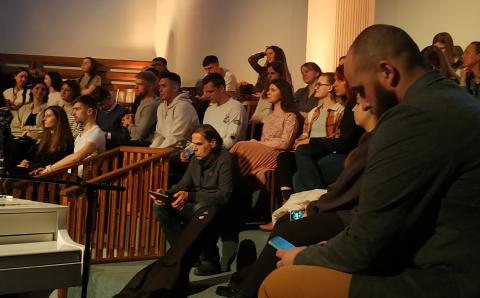Last night I did what I do every night as the day winds down: I mentally went through my day and noted all the things I didn’t get done. The list was long. Although the tasks should have been easy, they had been insurmountable. Chronic pain, disability-related muscle fatigue, and breathing difficulties can make regular work and family life feel like just too much.
I felt like I had failed at life, and this was a familiar feeling because this is a familiar routine.
I started thinking about neuroplasticity—the idea that our very thoughts can shape our brain. I know that choosing different thought patterns can reshape my brain, so I made the mental switch that I often do and started listing the tasks I did accomplish.
I felt better, but it wasn’t enough. Either way I was equating completed tasks with success, which isn’t actually changing my thought patterns. I needed to move beyond checking off boxes—or not—in my mind.
I remembered listening to accessibility advocate Chantal Huinink at a conference years ago, and one of her points has always stuck with me: Just like we can be prone to perfectionism, we can also be hung up on productivism.
That was an “aha moment” for me. Whenever perfectionism has come up in sermons or seminars I have always felt a bit smug because that’s not a struggle for me. I’m comfortable with things being a bit rough around the edges. I’m OK with things being a tad raw.
But this concept of productivism that Huinink spoke about hit me hard. I am absolutely a productivist. I love lists and crossing things off. I multitask as much as possible, and my favorite pastime is knitting because even my leisure needs to be productive.
This is what I need to rewire in my brain. Being productive is satisfying, but is it where I want to derive my self-worth? What is more important than productivity?
I remember a line from a training course at work: “We are human beings, not human doings.”
What does it mean to be a human being? How do I want to be?
I knew the answer immediately.
Love. To be is to love.
Scripture tells me that “if I have a faith that can move mountains but do not have love, I am nothing” (1 Cor. 13:2). Moving mountains would be the pinnacle of productivism and might even be a testament to one’s faith, yet without love, it would be meaningless.
So I asked myself: Was I loving today?
I mentally went over my interactions with people during the course of the day. Was I loving with my family? With my coworkers? With the friends I saw when we picked up our children from school? I carefully considered each scenario and evaluated my actions and attitudes. In some places I identified places to improve, but in others I could honestly answer yes. Yes, I had been loving. And what’s beautiful about love is that it can be given and received. I had most definitely received love.
What a difference this realization made in my mental state as I closed out my day. Rather than feeling like a failure, I felt like I had succeeded—and succeeded in a more meaningful way than if I had done the dishes (nope) or folded the laundry (partially).
So this will be my new routine. I will focus on being loving rather than falling into the trap of productivism, and I will reshape my brain until, I hope, my very being is oriented toward love.
About the Author
Jasmine Duckworth has been serving with Karis Disability Services (formerly Christian Horizons) since 2004 and has been disabled since 2015. As part of her role as community development manager she often speaks about disability, accessibility, ableism, and belonging. She is a mother, wife, and obsessive knitter.









